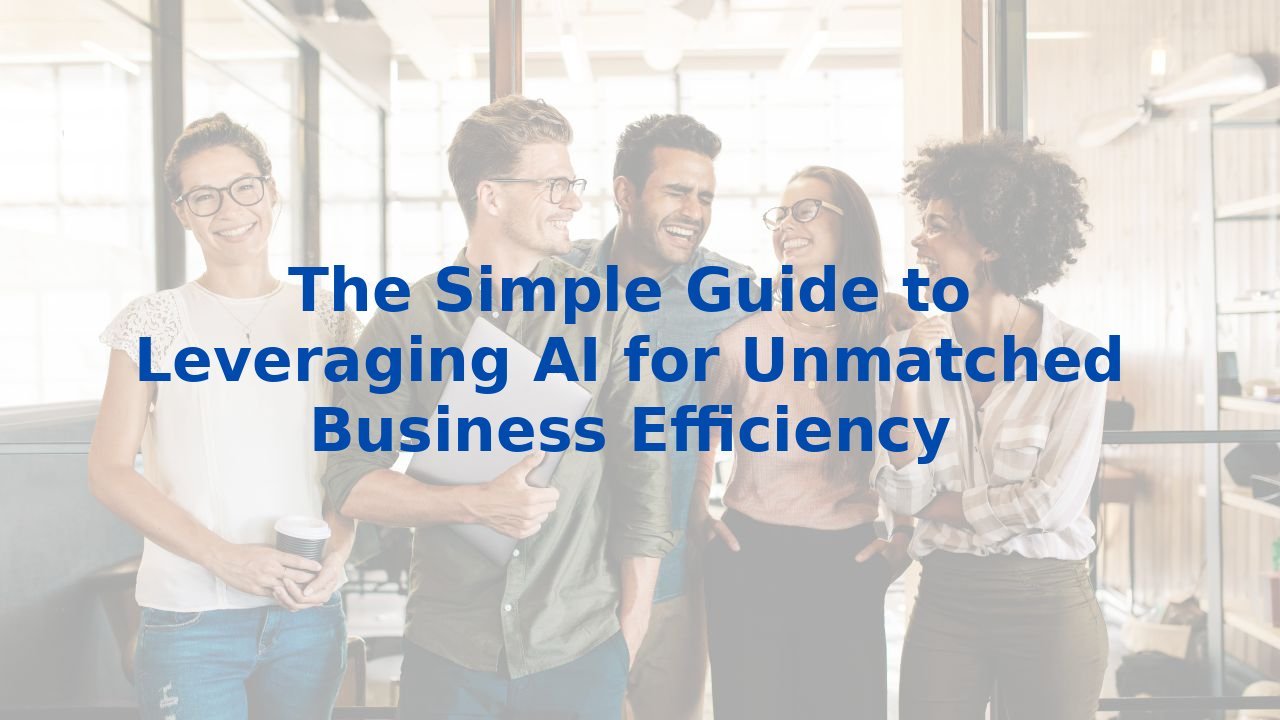The Simple Guide to Leveraging AI for Unmatched Business Efficiency
The Simple Guide to Leveraging AI for Unmatched Business Efficiency
Introduction
In a world where business landscapes shift in an instant, one technology has emerged not just as a tool but as a catalyst for transformation: Artificial Intelligence (AI). It's more than just a buzzword; AI is revolutionizing operations, enhancing decision-making, and redefining customer interactions. In this blog post, we will explore how AI can supercharge everyday business processes and why it is essential for organizations to embrace this technology wholeheartedly.
Enhancing Business Processes with AI
1. Automation and Operational Efficiency
Imagine your team freed from monotonous tasks, allowing them to redirect their energy toward strategic initiatives. AI automates these everyday repetitive activities—whether it’s responding to customer queries or processing data entries. By embracing automation, organizations can streamline operations, reduce errors, and foster an environment where creativity can flourish. This not only improves productivity but also contributes significantly to operational consistency.
2. Advanced Data Analytics
Data is the new oil, but only if you can refine it. AI shines here, capable of sifting through mountains of data at incredible speeds to unveil insights that inform better decision-making. Whether it's understanding customer preferences or predicting market shifts, AI helps leaders navigate complexities with confidence. By integrating AI analytics into business strategies, organizations can pivot swiftly, ensuring they stay ahead of the curve.
3. Customer Experience Personalization
In today's market, personalization is paramount. AI enables businesses to tailor experiences to individual customer needs, creating interactions that resonate. Intelligent chatbots provide immediate responses and can address issues based on user history, ensuring customers feel valued and understood. The result? Enhanced satisfaction and loyalty which can dramatically impact bottom lines.
4. Security and Risk Management
As cyber threats grow more sophisticated, so must our defenses. AI systems detect unusual patterns and swiftly identify potential risks, vastly improving an organization’s security posture. With AI safeguarding sensitive data and ensuring compliance, businesses can operate with peace of mind, allowing them to concentrate on growth and innovation.
5. Innovation and Product Development
Innovation doesn’t have to be a drawn-out process. AI accelerates product development cycles by refining designs based on real-time market feedback and customer data. This agile approach allows companies to not only keep pace with changing demands but also anticipate and create future trends. The fusion of human ingenuity and AI can lead to the creation of groundbreaking products that redefine industries.
Benefits of AI for Improving Efficiency
1. Time and Resource Savings
One of AI's most persuasive benefits is its ability to save time and resources. By automating mundane tasks, companies can refocus efforts on strategic initiatives, enhancing productivity. This not only optimizes workforce engagement but also reduces operational costs, creating a leaner business model.
2. Enhanced Decision-Making
AI empowers organizations to make better decisions through data-driven insights. By analyzing extensive datasets quickly and accurately, businesses can gain a competitive edge and allocate resources more effectively. The era of gut-driven decision-making is fading—welcome the age of informed choices.
3. Improved Customer Service
In a world where every interaction matters, AI elevates customer service in significant ways. AI-driven chatbots can resolve inquiries swiftly, allowing human agents to tackle complex customer needs. This synergy not only optimizes the customer journey but also builds a brand’s reputation for reliability and responsiveness.
The Importance of Training Employees for AI
While AI’s potential is immense, its effectiveness depends on the people behind it. Training employees to harness AI technologies is paramount.
1. Upskilling Workforce
Equipping employees with AI knowledge ensures they can leverage tools effectively. Training should focus on integrating AI into their everyday practices, from data analysis to process enhancement.
2. Adaptability and Innovation
With AI ever-evolving, a skilled workforce is critical for navigating change. Training fosters adaptability and encourages innovation—skills that align with this technological advancement.
3. Enhanced Collaboration
An AI-savvy workforce collaborates effectively with technology, creating synergies that drive organizational efficiency. With the right training, employees won’t see AI as a replacement but rather as a partner that amplifies their capabilities.
Conclusion
Artificial Intelligence is more than just a tool; it is a foundational element of modern business strategy. By embracing AI's potential, organizations can automate tasks, derive insightful data, personalize customer experiences, bolster security, and accelerate innovation. The journey doesn't stop at adoption; investing in training your workforce ensures that your organization not only survives in this transformative age but thrives. AI is here to stay, and the question is—are we ready to embrace it fully?



